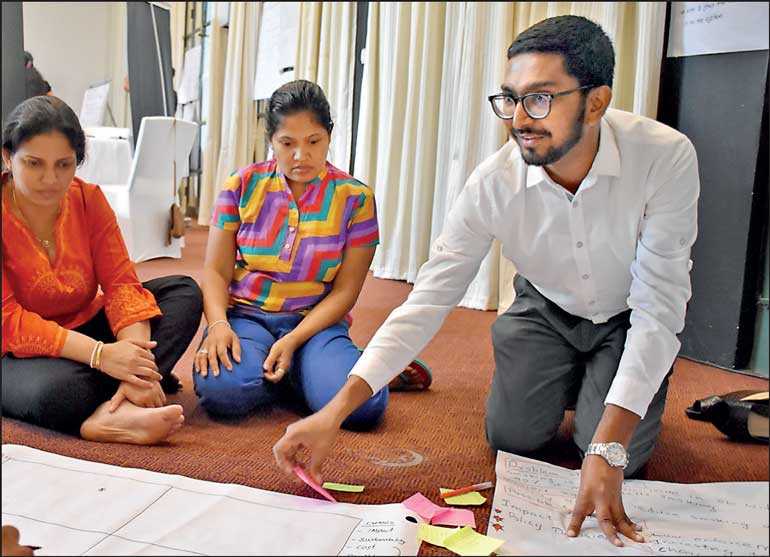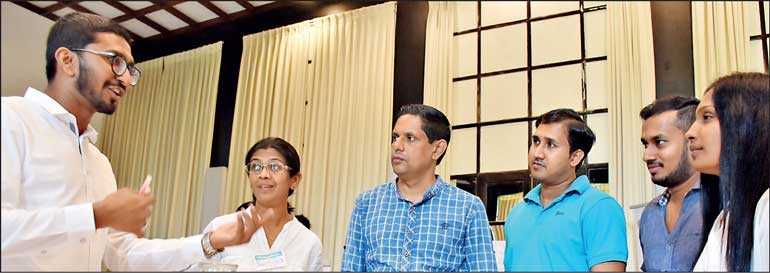Sunday Feb 22, 2026
Sunday Feb 22, 2026
Friday, 19 July 2019 00:00 - - {{hitsCtrl.values.hits}}


By Fadhil Bakeer Markar
There’s a movement taking place within public sectors across the world and Sri Lanka isn’t behind the trend. In fact, with the right investment and political will we could be a regional leader of this global movement.
In the last couple of years having spoken to and worked with colleagues who work with public sector in UK, Canada, Australia, Chile and the Asian Productivity Organisation in Japan, and also talking to public sector officials from the Royal School of Administration in Cambodia, the Development Academia of Philippines and officials from Indonesia, you see a definite global discussion on the critical role of an innovative public sector to achieve sustainable development.
The movement to modernise the public sector is linked to discussions around the 4th industrial revolution: a “technological revolution… that is blurring the lines between the physical, digital, and biological spheres”. Rapid change is the norm in the world we live in today, but it’s proving to be chaotic for traditional systems that were set up decades ago. This resonates very much with UNDP’s global thinking and commitment to increase the push for the next generation of government leaders.
The same is true in Sri Lanka. Citra Social Innovation Lab together with the Ministry of Science, Technology and Research, the Ministry of Public Administration and the Sri Lanka Institute of Development Administration (SLIDA), we see a hunger to modernise the public sector and build #NextGenGov leaders through innovation.
The challenges and opportunities of our time call on public sector officials to think out of the box and implement creative solutions to complex challenges. But in order to do that they need to be equipped with the right set of skills and mindset along with a supportive environment that encourages innovation.
Citra is working with many stakeholders on an incremental approach to promote innovation within the public sector. We understand that individuals change faster than organisations, which is why we’re working to integrate foresight and innovation with an ‘Inside-Out’ approach by working directly with the officials that represent the broader public institutions. These officers carry out the mammoth’s share of the work in ensuring Sri Lanka achieves the targets it has set for itself.
We’re choosing to invest in this vital resource to cultivate the next generation of government leaders. We’re working with them to build a network of innovators within the public sector, rather than pushing innovations onto a system that might not be ready to run with them yet.
The ‘Foresight and Innovation for #NextGenGov Champions’ program expands on existing skills to help officials better understand the needs of the citizens they serve and design solutions from a human-centred perspective, while working towards multiple possible future scenarios.
Following the success of the pilot program conducted in 2018, two learning programs for two more cohorts were launched this week with participants from over 35 public institutions in Sri Lanka along with several international participants. The 2019 cohort of the program is a testament to the global relevance of these tools for public sector excellence.
As Sri Lanka’s first social innovation lab, Citra is a proven leader in using these tools to prototype and test development solutions to ensure they are agile and holistic. As a joint initiative between the Ministry of Science, Technology and Research, and the United Nations Development Programme (UNDP), Citra facilitates creating an environment that is conducive to looking at problems from different perspectives, building capacities and strengthening institutions.
The Lab features a multidisciplinary team that brings in expertise from different angles having been exposed to training and experiences on systemic design, sense making, foresight, human centred design and more, facilitated by colleagues from Malaysia, India, Canada, UK, Australia, Moldova, and Indonesia. The #NextGenGov program is the most impactful way for Citra to now contextualise and share that learning to position Sri Lanka at the forefront of building the next generation of government leaders.
As a result of our own learning during the 2018 pilot we have made changes to the second iteration of the program. Because there’s only so much you can learn in theory, participants are required to implement these tools in their offices and departments within a there-month mentorship period and report back on their experiences. We are also continuing our engagement with participants of the 2018 cohort that went on to successfully utilise foresight and innovation tools in their workplaces.
One such champion is Jeevanthie Senanayake, a Director in the National Budget Department of Sri Lanka. Her feedback on the first workshop is an encouraging testament to the impact of providing skilled officials with the tools they need to excel.
“I have received quite a number of trainings from the Government sector, with that experience frankly speaking, I did not expect the Citra training to be very different from what I had experienced before. But this workshop catered directly to what we are doing as Sri Lankan administrative service officers and exposed me to really useful tools that I will be using in my work.”
This was one testimony out of the 30 that attended last year. We are quite certain that we will hear many more from this year’s cohorts as well. Our ambition is to work with relevant stakeholders and institutionalise this type of learning that will help make our public sector more innovative to take on the challenges and opportunities of the 4th Industrial Revolution.
(The writer is the lab lead a.i. at Citra Social Innovation Lab and team lead for Partnerships and Engagements for UNDP Sri Lanka. Instrumental in the establishment of Citra, Fadhil has been championing innovation efforts within UNDP and in Sri Lanka since 2014, and is currently leading Partnerships and Engagements for UNDP Sri Lanka.)